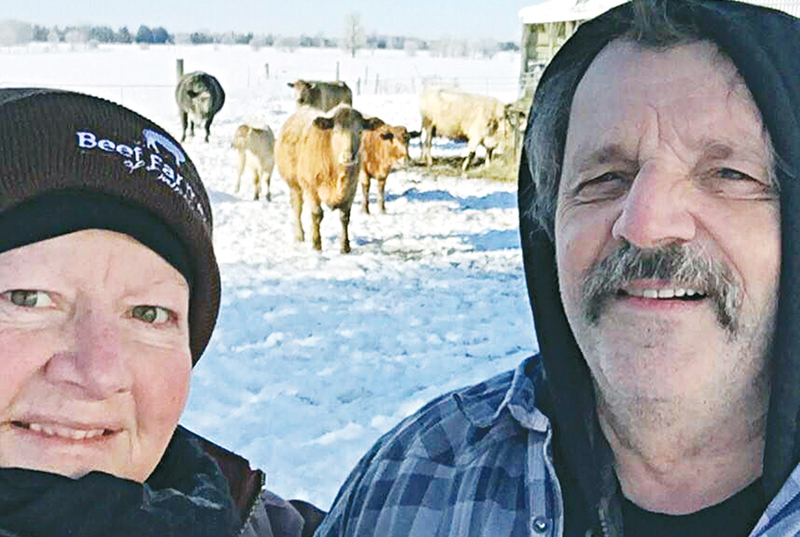Courtesy Photo
INKERMAN – Jacqueline Kelly (Jackie) and Steven Pemberton of PemDale Farms have been recognized with the 2021 TESA Award from the Beef Farmers of Ontario (BFO), for their efforts to find that elusive balance between the health of the land and the farm they operate on it. The award is sponsored by the RBC Royal Bank.
The couple own and manage a small beef farm in North Dundas.
Their nomination was submitted by Ron Wilson from the Dundas Cattlemen’s Association.
The award, formally called The Environmental Stewardship Award, was handed out to the Pembertons at the Beef Farmers of Ontario annual general meeting. This year, the meeting was held as a virtual event on Feb. 17 and 18.
The award acknowledges the efforts of producers to take that extra step beyond standard industry conservation practices. Their work, looking after the land, sets positive examples for other cattle producers and the public.
A press release from the BFO stated: “Each nominee demonstrates innovation and attention to a wide range of environmental stewardship aspects in their farm operation. Such innovations extend beneficially to areas far beyond their land, including water, wildlife and air.
The nomination for the award began with the Dundas Cattlemen’s Association and was looked after by the association’s secretary Ron Wilson.
Jackie and Steven were thrilled to be singled out for the award.
Pemdale Farm is a 200-acre third generation farm.
Jackie serves as the Zone 11 director on the Ontario Federation of Agriculture (OFA) board of directors representing the counties of Dundas, Frontenac, Grenville and Leeds.
“I knew we had been nominated but we were surprised to be selected.”
The farm started out as a dairy operation then became a beef farm.
“In the farming world there are best management practices,” said Jackie. “They are scientifically recorded, and there are recommendations on how to improve the habitat, fertility, and diversity of farms.”
“Steven and I agreed that we liked the diversity that pasture lands and grazing lands bring. We wanted to ensure that we were managing our on-farm nutrients the best way we could,” she said.
Pemdale Farm is small enough to not be regulated by the province when it comes to the nutrient management act, but the couple went ahead anyway to make sure the farm environment was safe and healthy.
“We decided that even in our small-scale operation we would look at managing the nutrients of our cattle,” she said.
Jackie and Steven have been involved in several research projects designed to look at the balance between different activates on farms and their by-products, for example, manure and wetlands diversity.
One project described in her nomination papers was the design, construction, implementation and operation of a system of controlled runoff from the cattle exercise yard, which includes a manure storage area on a concrete pad adjacent to the barn.
The papers stated: “The project would need to generate value to the community as well as serve to improve the on-farm situation – and the final result must be science based. This was accomplished by creating a “research project” involving other participants. For this project, these organizations became participants: Ontario Ministry of Agriculture, Food and Rural Affairs, Farm and Food Care Ontario, Agricultural Adaptation Council, Agriculture and Agri-Food Canada, South Nation Conservation, Natural Sciences and Engineering Research Council of Canada (NSERC), and the University of Ottawa (U of O). The fact that all these organizations participated in this project indicates that a wide variety of people from differing disciplines have evaluated it and found merit in it. The final analysis of that study was that both systems in the “runoff” control project were very effective at increasing total removal rates from 94-97 per cent, with groundwater quality only marginally impacted directly below the vegetated filter strip.
In conclusion, a combination of a pond-wetland-pond technology followed by either a natural flow path or vegetated filter strip is a promising solution for beef producers to achieve excellent treatment at low cost.”
Steven said, “It was a great learning experience.” One of the challenges he enjoyed taking on was educating urban researchers about the reality of working on a farm and dealing with all the environmental challenges found there.
Steven looked at some of the ideas that made his farm better with a sense of humour.
He said, “The electric fence is a great solution for cattle. It keeps predators out, cattle in and knocks down anything that touched it, including me.”
Jackie said the effort to manage their nutrients paid off and was an example to other small operations that nutrient management was a good idea.
“It can work on a small farm with a small footprint,” at low cost.
She said, “I hope it encourages other farmers with small footprints.”
A press release from the BFO in Dundas County stated: “The Pemberton’s have developed their farming strategies successfully by incorporating research and innovation to further the sustainability of their operation, as well as actively engaging with the community around them. The couple, Jackie and Steven have demonstrated their commitment to the environment by focusing on development of research, effective nutrient management, and caring for waterways.
Making decisions based on science has always been integral in the environmental management of the Pemberton’s farm.

Joseph Morin is the Editor of the Eastern Ontario AgriNews, and the Record. He is, despite years of practice, determined to eventually play the guitar properly. He has served the Eastern Ontario community as a news editor, and journalist for the past 25 years with the Iroquois Chieftain, Kemptville Advance, West Carleton Review, and Ottawa Carleton Review in Manotick. He has never met a book he did not like.









